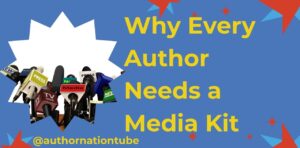
Unlock the secret to writing your book with leadership energy so you can share your message with clarity, confidence, and impact.
Listen on Your Favorite Podcast Platform
Author Nation sits down with leadership communication expert Dr. Laura Sicola to unpack a frustration many nonfiction authors face: knowing what they want to say but struggling to say it clearly and with confidence. We explore how to write your book with leadership energy, what it means to lead with voice, not perfection, and how to own your message as an author—even when imposter syndrome and perfectionism try to pull you back.
Feeling stuck or unsure of your authority? This episode offers tools and a mindset shift to help you move forward.
Understanding Writing with Leadership Energy
Leadership energy in writing means showing up on the page with clarity, confidence, and purpose. Dr. Sicola explains how your “author presence” is just as vital as your leadership presence in the boardroom.
To transform readers, you need a powerful message delivered with precision and conviction.
Dr. Laura Sicola, Leadership Coach
Dr. Laura Sicola is a leadership communication and influence expert, speaker, author of Speaking to Influence: Mastering Your Leadership Voice, and host of the Global Top 1% podcast, Speaking to Influence: Communication Secrets of the C-Suite and the podcast ALPHAWHISPERERS: Genesis. Her mission is to transform executives into confident, inspiring leaders. A cognitive linguist by background, she has trained and coached executives at Fortune 500 companies and non-profit leaders from around the world.
Laura’s TedX talk, “Want to Sound Like a Leader? Start by Saying Your Name Right,” has nearly 7 million views.

Resources
Ready to stop second-guessing and start showing up as the leader your message needs?
From Feedback to Breakthroughs: Asking the Right Questions
One of the most powerful takeaways from this episode is how to shift from vague requests for feedback to targeted questions that move your writing forward.
We’ve all asked someone, “What do you think?”—but that question often leads to hesitant praise or broad advice. Instead, Laura encourages nonfiction authors to ask clear, specific questions that invite useful, actionable responses.
Here’s what that can look like:
“Was this analogy clear and relatable?”
“Did I include too much detail here?”
“Was the argument easy to follow in this section?”
By narrowing your questions, you make it easier for your readers, peers, or mentors to give feedback that helps—not confuses—you. This not only improves your writing, it boosts your confidence because you’re not inviting vague judgment—you’re asking for help to sharpen your message.
💡 Pro tip: Ask for feedback early, and ask it often. The more you practice receiving it with intention, the faster your writing evolves.
Imposter Syndrome and Perfectionism: The Evil Twins of Authorship
If you’ve ever sat at your keyboard thinking, “Who am I to write this?”—you’re not alone.
In this episode, Dr. Laura Sicola names what so many authors feel but hesitate to admit: imposter syndrome and perfectionism are the evil twin sisters that keep us from sharing our work.
Imposter syndrome whispers your ideas aren’t “expert enough.” Perfectionism piles on, telling you your writing isn’t ready until it’s flawless. Together, they create a loop of silence, second-guessing, and stalled manuscripts.
But Laura offers a reframing that stops that cycle in its tracks:
👉 “It’s not about you.”
Your book isn’t about proving your worth—it’s about serving your reader. All your experience is valid, and your message matters. Your story—told with clarity, not perfection—is what your audience needs.
So instead of asking, “Am I good enough?” try asking, “Who can I help by sharing this today?”
💡 Reminder: Done is always better than perfect. Growth happens in the doing—not the waiting.
FAQs About Writing with Leadership Energy
What does it mean to write with leadership energy?
It means writing from a place of clarity, confidence, and purpose—bringing your message to life with presence and conviction.
What if I believe I’m a phony?
Imposter syndrome is common. Laura’s advice? “It’s not about you.” Focus on your reader. If your message can help someone, it’s worth sharing.
What if I am not prepared?
No one is completely prepared. Lead with what you know now. You can revise—but first, you must begin.
How do I deal with criticism?
Be specific in the feedback you seek. Ask intentional questions and receive feedback with gratitude. Not all feedback is a threat.
How do I build confidence in my message?
Practice. Get used to being visible. Speak your message aloud. Share it, revise it, stand by it.
Action Steps for Nonfiction Authors
Name the Emotion
When you hit a wall in your writing, pause. Identify the feeling—frustration, fear, pressure—and give it a name. Awareness resets your energy.
Time Block Your Writing (and Review Time!)
Don’t just write—schedule time to review and implement your insights. Use color-coded notes (Laura uses green for actions, yellow for ideas) to track and act on important points.
Let Go of Perfect
As Laura says, “Perfection is the enemy of done.” Focus on progress over polish. Get the ideas down—refinement comes later.
👉 What’s your biggest struggle when writing with leadership energy? Comment below—we want to hear from you!
Similar Posts You Might Enjoy!
Want to write the best book you can? Work with me 1 on 1 here: Author Nation Chat
Recent Articles

Promote Your Book Globally With One Link | How To Use Universal Book Links
What Does It Mean to Promote Your Book Globally With One Link? If you’re still copy-pasting separate links for Amazon, Kobo, Barnes & Noble,

It’s Time To Get Creative With Book Launches | Do Authors Need a Book Launch Party
When it comes to publishing a nonfiction book, it’s time to get creative with book launches. Whether you’re an introverted expert or a bold thought

Why Every Author Needs a Media Kit | How To Create a Press Kit That Gets You Invited To Speak
Why Every Author Needs a Media Kit for Visibility Let’s face it, getting booked on a podcast or featured by a journalist isn’t about

